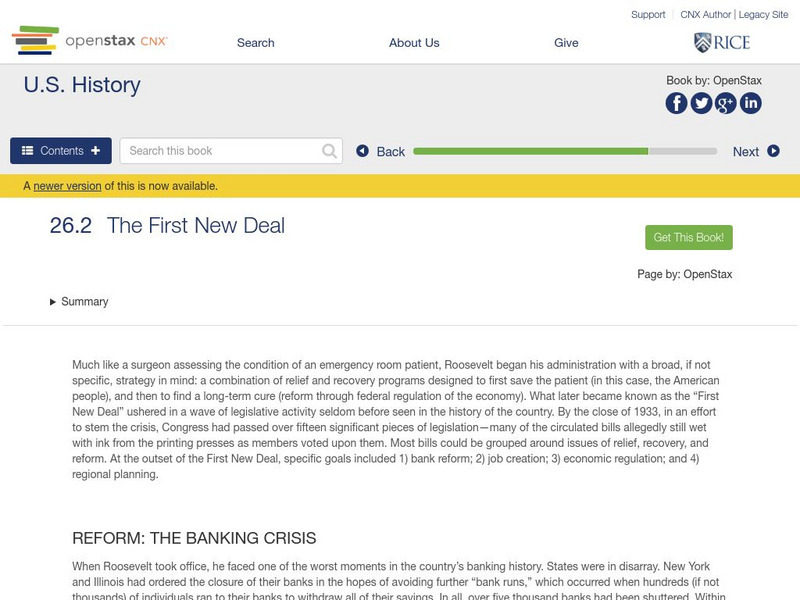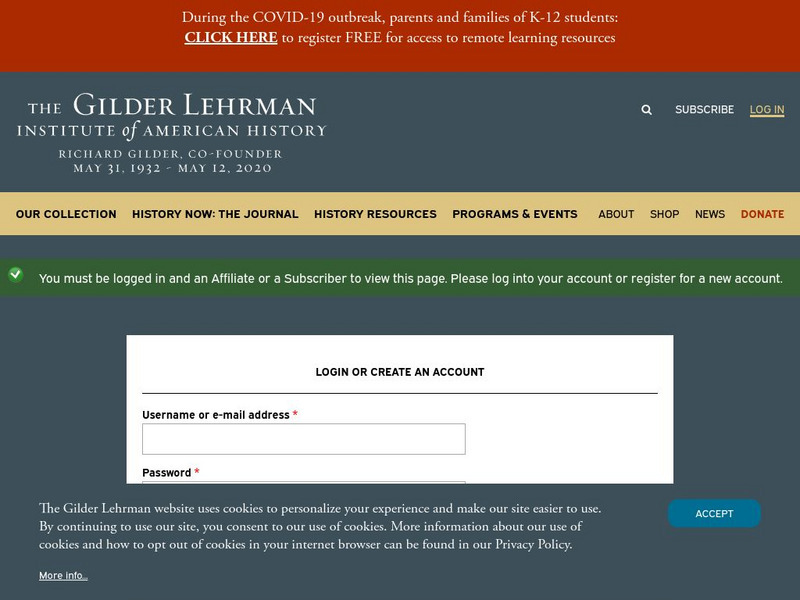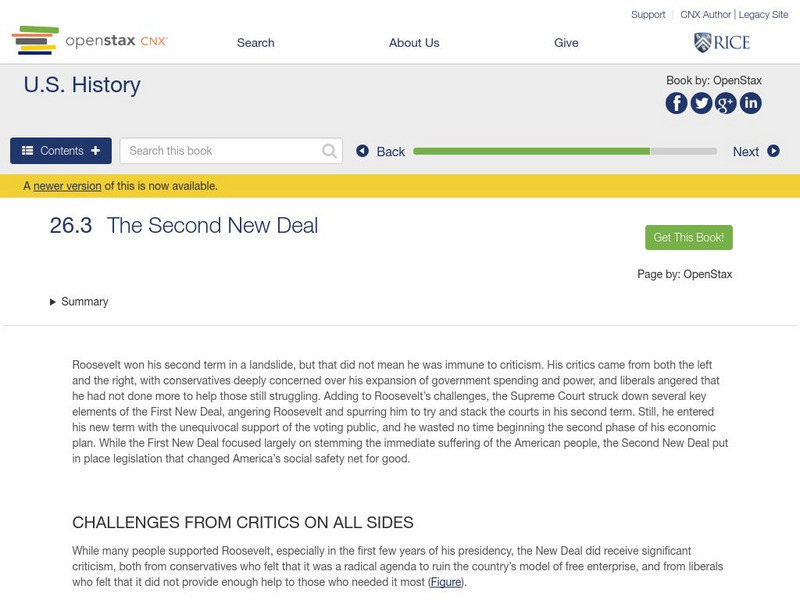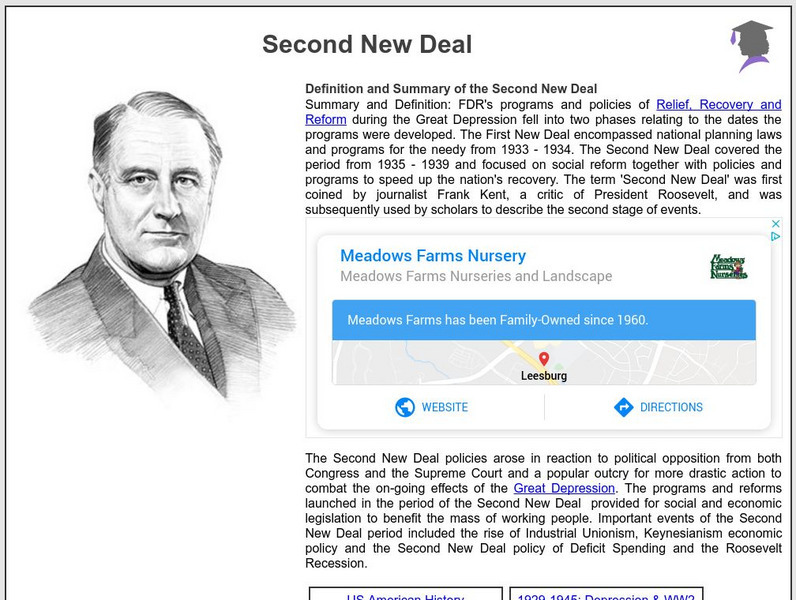Hi, what do you want to do?
National Endowment for the Humanities
NAACP's Anti-Lynching Campaign in the 1930s
Students examine the anti-lynching campaign sponsored by the NAACP in the 1930's. In this social justice lesson, students study the history of the anti-lynching campaign and determine why it was not successful. Students conduct research...
Curated OER
Immigration and Migration: Today and During the Great Depression
Students conduct interviews, analyze primary sources including docuements and images to gain an inderstanding of the causes and effects of he Great Depression and immigration.
Curated OER
Jackie Steals Home
Students read articles relating to Jackie Robinson's breaking of the racial barrier in professional baseball. This leads to a deeper exploration of racism in the United States. They use a variety of worksheets imbedded in this plan to...
School District of Detroit
The Articles of the Confederation
Primary historical sources can be a challenge for some readers, so these seven guided-reading questions will be very useful to US History or Government classes studying The Articles of Confederation. Each question has multiple parts and...
Curated OER
Poverty Lesson Plans
Poverty lesson plans can help students understand the issues involved, and how countries are trying to tackle this problem.
Curated OER
Franklin D. Roosevelt
In this presidential history worksheet, learners respond to 9 essay and short answer questions about the presidency of Franklin D. Roosevelt.
Curated OER
English Vocabulary Skills: AWL Sublist 10 - Exercise 2b
In this online interactive English vocabulary skills worksheet, students answer 10 matching questions which require them to fill in the blanks in 10 sentences. Students may submit their answers to be scored.
Curated OER
What are the Ethical Considerations of Radon?
In this radon contamination worksheet, young scholars explore the legal and ethical issues associated with radon found in indoor air of homes. Students construct a set of laws that promote fairness to all sellers, buyers and real estate...
Curated OER
Activism of Terrorism
Students research animal rights issues and controversies and determine whether they believe extreme tactics are justified. They practice debate and rhetoric skills by successfully arguing both sides of the issue.
Curated OER
In the Melting Pot
Students work in small groups, each group examining a different aspect of the immigration process (such as visas, work permits, and citizenship exams) or of illegal immigration (such as deportation), to better explain the immigration...
Curated OER
The foreign and domestic policies of Lyndon B. Johnson
Eleventh graders study and evaluate the successes and failures of LBJ's domestic and foreign policies. They formulate historical questions and defend findings based on inquiry and interpretation. Each student identifies, analyzes and...
Curated OER
Redistricting: How Our Representatives Select Voters
Students examine the practice of redistricting. In this American politics activity, students read the provided articles "The Gerrymander," and "Reforming the Gerrymander." Students respond to the provided discussion questions.
Curated OER
Telegram from Senator Joseph McCarthy to President Harry S. Truman
Students research the McCarthy hearings to determine the following: time frame of hearings, how they were broadcast, how the press reacted, and how the American people reacted in light of the Korean Conflict and the Cold War.
Curated OER
Constitutional Convention
Students develop a constitution for a hypothetical country called Permistan by reviewing the constitutions from the other countries they have already studied.
Curated OER
Rural America in Transition
Students examine the changes in rural America in an economic sense. In groups, they research the problems rural areas face in the 21st century. They examine the economic policies in effect and how they help or hurt rural America.
Curated OER
Freedom of Information Day
In this Freedom of Information Day worksheet, students complete activities such as reading a passage, phrase matching, fill in the blanks, correct words, multiple choice, spelling sequencing, scrambled sentences, asking questions,...
Curated OER
Dictation: Violence
In this dictation worksheet about violence, learners take dictation from a passage about violence.
OpenStax
Open Stax: Franklin Roosevelt and the New Deal 1932 1941: The First New Deal
Examines the legislation enacted under Roosevelt's First New Deal; what was good, bad, and effective under this New Deal; and what the scope of Roosevelt's plan was for fixing the U.S. economy.
Gilder Lehrman Institute of American History
Gilder Lehrman Institute: History Now: The New Deal
[Free Registration/Login Required] Read about the New Deal, its programs, and the ways it helped a nation in the grips of the Great Depression. The New Deal was not universally popular, so find out what Franklin Roosevelt did to keep the...
OpenStax
Open Stax: Franklin Roosevelt and the New Deal 1932 1941: The Second New Deal
Examines the legislation enacted under Roosevelt's Second New Deal, and how the New Deal as a whole affected women, African Americans, and Native Americans.
New Deal Network
New Deal Network: Presidential Statement on n.i.r.a.
Text of a speech given by Franklin D. Roosevelt after he signed the bill known as the National Industrial Recovery Act. Discusses purposes and intended impact of the legislation.
PBS
Wnet: Thirteen: Freedom: A History of the u.s: New Deal
Read about Franklin Roosevelt's background, his political experience before he was elected president in 1932, and his actions to help the people of the United States in the grips of the Great Depression.
Siteseen
Siteseen: American Historama: Second New Deal
Discussion of the programs and reforms launched in the period of the Second New Deal that provided for social and economic legislation to benefit the mass of working people.
University of Texas at Austin
Dolph Briscoe Center for American History: Garner the Vice President (1933 1941)
As part of a larger biography, this part describes John Nance Garner's tenure as Franklin D. Roosevelt's vice-president for Roosevelt's first two terms. Find out about his importance to the enactment of the New Deal legislation.




























